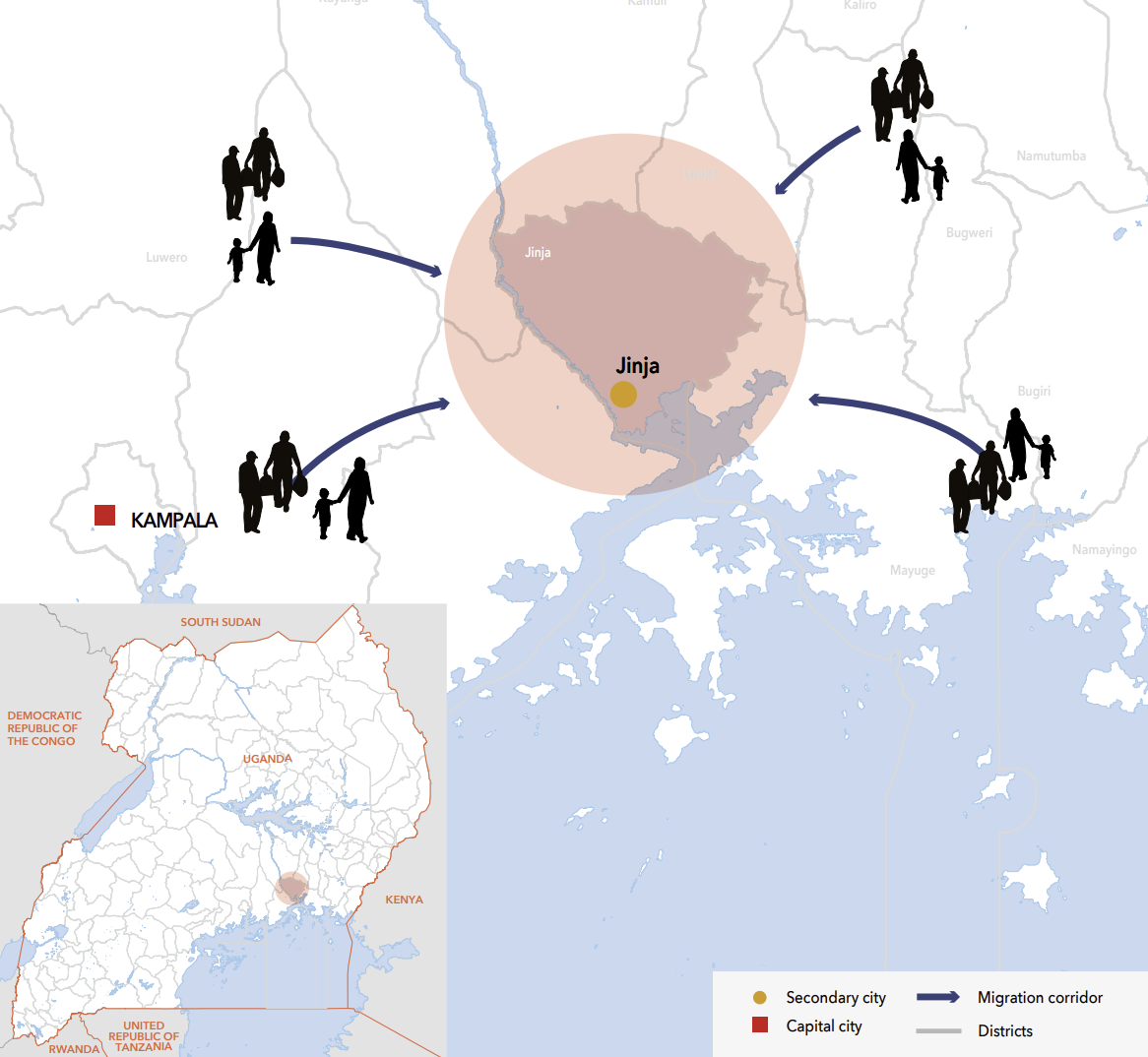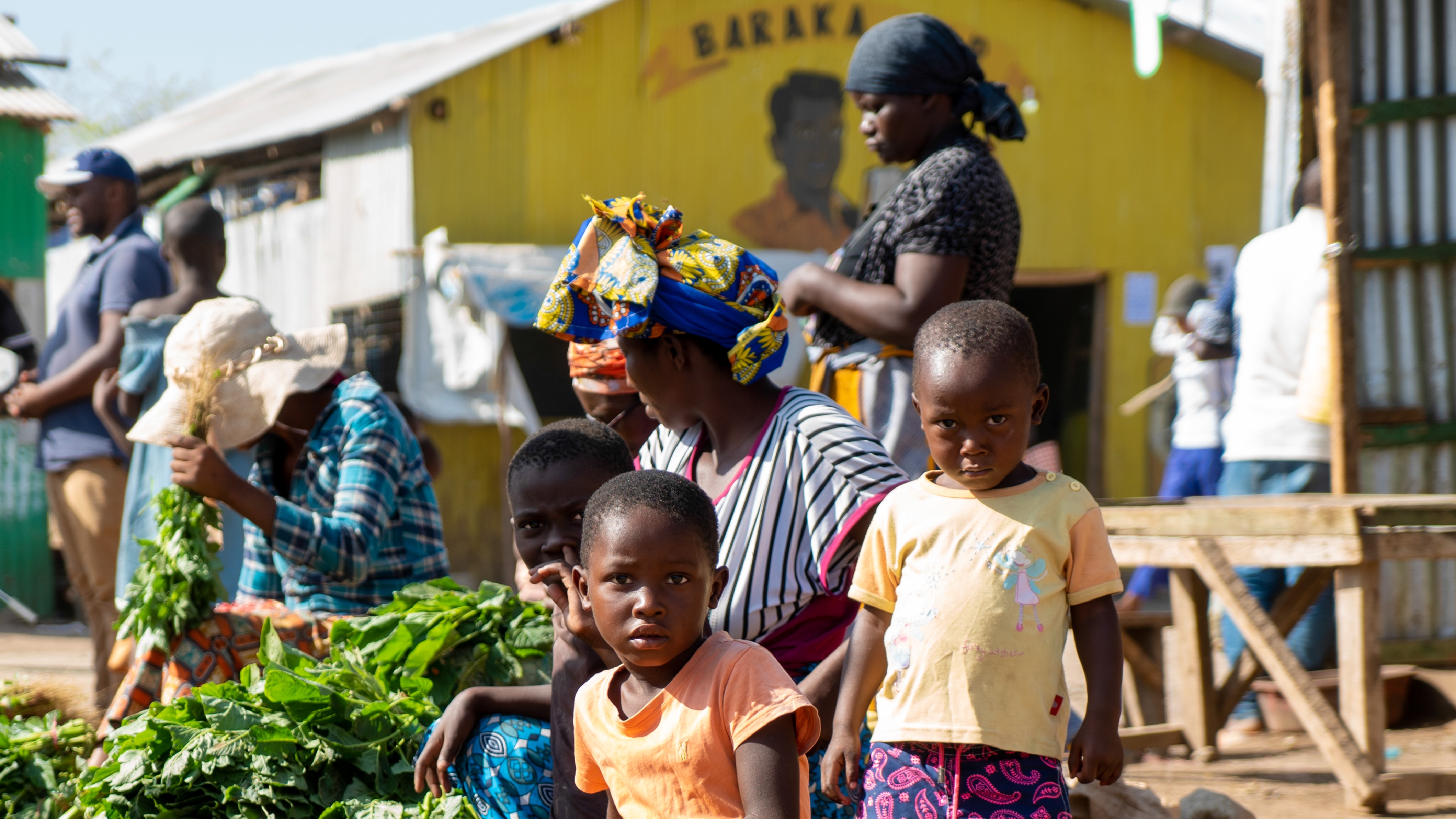Jinja has long attracted migrants seeking economic opportunities. The city and its adjacent municipalities struggle to provide equitable access to services and economic opportunities to their residents. Cooperative approaches across local governments in Greater Jinja have the potential to foster development by sharing resources and experience.
Another issue is that many migrants live in areas further away from the urban centre. Digitising work-related and basic urban services can help overcome spatial distances and facilitate resource-efficient cooperation. This will enhance equitable access to, and provision of, services for communities around the region.
This project scales up interventions in Jinja and its surrounding areas to enable greater access to decent work opportunities and quality basic municipal services for migrants and vulnerable host communities.
It emphasises collaborative approaches with private sector actors to enhance efficiency, scale, and sustainability of interventions. The project will also pilot digitalisation of financial and municipal services.
Digitised waste recycling shows why empowering the urban poor is key for a just transition to a more inclusive and green economy.
Migration in Jinja
Migrants born outside Jinja or Uganda make up over half of the city’s population.
The majority are women and youth living in poverty, either unemployed or underemployed in low-paying informal activities.
Most of the migrants in Jinja and its surrounding corridors remain undocumented and live together in slums with the city’s existing poor population.

Partners
The project is an innovative partnership between the Ugandan slum dwellers support organisation ACTogether; the Jinja City Council; Ensibuuko, a company specialising in digital financial inclusion; Ecoplastile, a social enterprise specialising in pro-poor digital waste-management services; and the women’s rights organisation WORI.
Activities
- Training migrant and host community saving groups in financial, enterprise, and digital skills to run successful enterprises and access financing.
- Digitising financial services to service migrant communities previously excluded due to spatial and other barriers.
- Piloting micro-equity, a new financial product that helps boost funding available to saving groups.
- Upgrading the Kyamagwa market with a paved floor, roofing, solar-powered electricity for lighting and safety, and sanitation facilities.
- Piloting an innovative digital waste management approach with training and financial resources for grassroots recyclers and waste agents.
- Establishing a digital platform to integrate the waste pickers into the highly profitable plastic recycling value chain.
- Collecting over 1,200 metric tons of waste and saving over 2,450 tonnes of CO2 emission, helping to make Jinja a cleaner and healthier city.
- Convening multi-stakeholder initiatives and dialogues.
Scaling Up Phase I
From 2019—2022, Cities Alliance worked with Jinja City to strengthen its capacity to receive, manage and socio-economically integrate labour migrants.
Slum dwellers mobilised migrant and non-migrant households into 162 saving groups with 8,828 members (42% women) and used the savings for micro-community enterprise projects.
A Housing Upgrading Fund supported slum dwellers to improve their tenure security and enable future access to basic services. City authorities are processing 250 titles as a result, aiming to provide secure tenure to approximately 1,500 people.
This project scales up interventions to Jinja's surrounding areas and adds new components, such as digitalising financial and municipal services.
Anticipated Results
Access to better work opportunities
- At least 18,000 migrants, forcibly displaced and vulnerable host community persons will benefit from services that enable them to access new or better work opportunities in Jinja City and its surrounding rural-urban migration corridors.
- The partners will train 600 migrant and host community saving groups in financial, enterprise, and digital skills to run successful enterprises and access financing. The saving groups will benefit from the acquired skills, the mobile platform, and the offered financial services, including digital savings, access to loan products, and micro-equity services.
- By digitising financial services, migrant communities that were formerly excluded due to spatial and other barriers will now be serviced.
- Private sector-driven training on business plans, marketing, income, and expenses and record keeping will build capacities of saving groups to gradually become a business case for larger loan products.
- A pilot group of 2,400 beneficiaries of the saving groups will access microequity, a new financial product which helps boost the amount of funds directly available to the members of the group to borrow and invest in their businesses.
- At least 3,600 beneficiaries will experience new or better work opportunities as a result of these services provided by the project.
Multi-stakeholder dialogues
The project will convene two local multi-stakeholder initiatives and dialogues (on remittances, impact investments, and knowhow by migrants and diasporas) that engage the private sector, government, and civil society.
Access to municipal services
- At least 15,000 migrants, forcibly displaced, and members of vulnerable host communities will access basic municipal services due to the project.
- It will upgrade Kyamagwa market, which is used primarily by migrants and members of vulnerable host communities – most of them women – to sell and trade their products. The participatory physical upgrading will include paving the dirt floor and constructing roofing, solarpowered electricity for lighting and safety, and sanitation facilities.
- It ispiloting an innovative digital waste management approach. Grassroots recyclers and waste agents will be trained and receive technical and financial resources to run successful recycling businesses. They will gain access to a Wasteinsure Wallet System to redeem points into cash, school fees, and microinsurance.
- A digital platform will connect 9,000 households, 3,000 waste pickers, 300 waste agents, and the largescale plastic recycling sector, in the process integrating the waste pickers into the highly profitable plastic recycling value chain.
- According to estimates, the project will collect over 1,200 metric tons of waste – equivalent to over 10 million plastic water bottles – and save over 2,450 tonnes of CO2 emission, helping to make Jinja a cleaner and healthier city.
Participatory policy dialogues
The project will will also convene four local initiatives and policy dialogues on inclusion and social cohesion, including durable solutions for forcibly displaced persons, that engage different actors (governments, private sector, and civil society).
A gender analysis and theory of change will inform locally appropriate gender transformative action in the context of Greater Jinja. The project also focuses on the needs and opportunities of youth within Greater Jinja and adapts digital services for this purpose.
The project takes a dedicated approach to women’s empowerment. It is led by ACTogether and the National Slum Dwellers Federation of Uganda, where women represent 70% of the leadership and 60% of members.
The local women’s empowerment organisation, Women’s Rights Initiative, will lead gendertransformative action, notably during the market space upgrading and public information campaigns.
Financial literacy training will strengthen women’s capacity to decide, access, and use mobile money services. The waste management component will ensure equal pay for both male and female waste collectors through a set price for plastic at the waste collection points. Women and girls will be sensitised to economic opportunities in waste and other sectors through radio talks and school campaigns.


